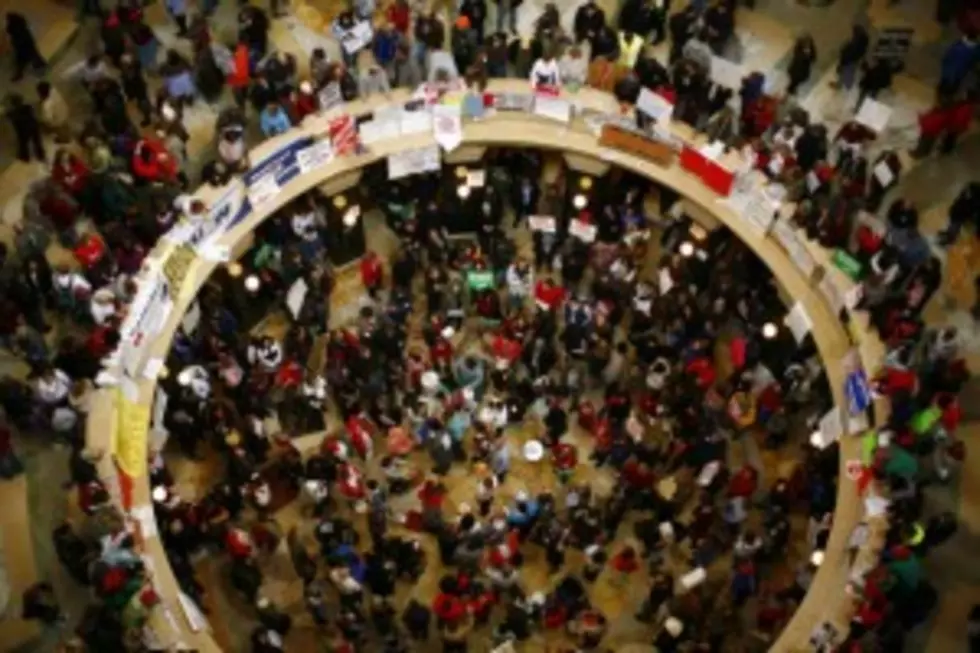
Wisconsin Governor Won’t Budge
As union supporters geared up for their for sixth day of protests at the Wisconsin Capitol, Gov. Scott Walker reiterated Sunday that he wouldn't compromise on the issue that had mobilized them, a bill that would eliminate most of public employees' collective bargaining rights.
Democratic lawmakers have said they and union members would agree to financial concessions that the Republican governor wants in exchange for workers keeping their collective-bargaining rights. But Mr. Walker said he wasn't willing to budge, and he expected the bill to pass as is.
"We're willing to take this as long as it takes because in the end we're doing the right thing," he told Fox News from Madison.
On Saturday, public employee union members protesting against the bill were met by several thousand counter demonstrators from the tea party waving "Don't Tread on Me" flags and shouting "Pass the bill!" Officials estimated the total number of people in and around the statehouse near 70,000.
The clash of ideologies and values between the groups made for a loud and rambunctious afternoon which saw red-faced protesters screaming at—and frequently past—one another.
"The guy in front of me is a total tool!" shouted Phil Landowski, as he followed Mike Daly down Main Street. Mr. Landowski, who was carrying a sign that said "End Collective Greed," was infuriated by the sign Mr. Daly was holding supporting public employees benefits.
"Do you know much these people make?" Mr. Landowski, bearded and bespectled, asked referring to public-school teachers
"Why would I believe you?" asked Mr. Daly, a stay-at-home dad. "You're a crazy person!"
The exchange, and countless others like it, was the culmination of tensions that have been simmering here since Gov. Scott Walker proposed a bill that would close a projected $3.6 billion shortfall by forcing public employees to pay 5.8% of their salary toward their pensions and 12.6% of healthcare premiums, up from 6% on average. On top of that, Mr. Walker aims to cut many of the collective bargaining rights from union members, a move he says will prevent massive layoffs but which union members say will take away a basic human right.
A rally planned for noon Sunday was expected to draw a smaller crowd, although still in the thousands, because of a winter storm bringing several inches of snow to the Madison area.
An AFL-CIO spokesman said unions were planning rallies, vigils and lobbying events in 29 states during the coming week, aimed at halting efforts to cut union members' pay and benefits or roll back collective bargaining rights.
Rather than watch the bill pass over their minority votes, 14 Democratic state senators fled Wisconsin on Thursday, bringing the legislative process to a halt and giving time for union backers, including a political organization affiliated with President Barack Obama, to rally support at the statehouse.
By Friday, the protesters numbered about 30,000 and schools around the state were closed as teachers headed to Madison to march.
But by Friday night tea party-affiliated organizations were marshalling their own members, and on Saturday morning several thousand counter demonstrators began spilling into Madison carrying signs like "Sorry we're late, we work for a living" and "The gravy train is over." Pro-union demonstrators plan another day of protests at Wisconsin's state capital. They're protesting Governor Scott Walker's budget proposal calling for unionized public employees to pay more for pensions and health insurance.
As they gathered Democratic Sen. Jon Erpenbach, who had stayed at a Chicago hotel Thursday and Friday nights, issued a statement saying he had learned that the state's 170,000 public employees were willing to accept the pension and benefit concessions if the governor left their collective bargaining powers in place.
"This is a real opportunity for us to come together and resolve the issue and move on," Sen. Erpenbach said. "It is incumbent upon Gov. Walker to seriously consider and hopefully accept this offer as soon as possible." Mr. Erpenbach said those concessions would "solve the budget challenge."
Christina Brey, a spokeswoman with the Wisconsin Education Association Council, the state's biggest public-sector union with 98,000 members, confirmed that unions are willing to accept the increased contributions to pensions and healthcare but won't give up their bargaining rights without a fight.
"We're on board if these financial contributions need to happen for the budget fix, but we are absolutely opposed to stripping collective bargaining rights in our state," she said.
But Senate Majority Leader Scott Fitzgerald reaffirmed Saturday that Republicans are not budging.
"The bill is not negotiable," Mr. Fitzgerald told the Associated Press. "The bill will pass as is
More From News Talk KIT









